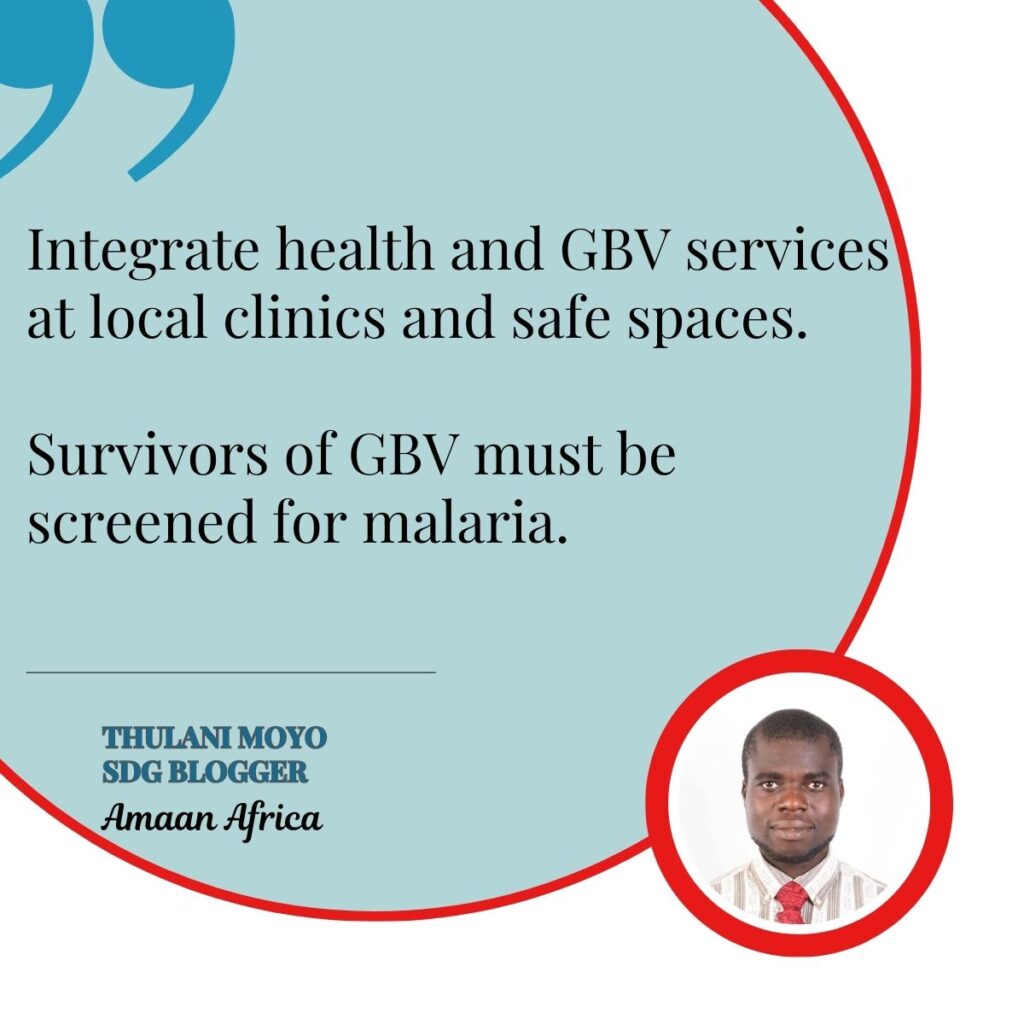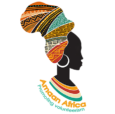
In 2023, Africa’s malaria death rate was estimated at 52 per 100,000 people – more than twice the target set by the global strategy to end malaria by 2030. A WHO report released in December showed 263 million cases in 2023, 11 million more than in 2022.
The Overlooked Connection
Malaria kills over 600,000 people every year, with Africa bearing over 95% of global cases. At the same time, 1 in 3 women globally experience GBV, with rates often higher in conflict-affected and rural African communities. What remains largely unspoken is how these two issues intersect:
-Women in abusive relationships are less likely to access malaria prevention tools like insecticide-treated nets or timely healthcare.
-Girls in insecure households often sleep in overcrowded or poorly ventilated spaces—ideal breeding grounds for mosquitoes.
-Pregnant women, already more vulnerable to malaria, are often denied control over their health decisions due to controlling or abusive partners.
-In crisis settings, such as during displacement or natural disasters, women may be forced into transactional sex to access healthcare, mosquito nets, or food—exposing them to both physical abuse and disease.

As we celebrate World Malaria Day today the 25th of April 2025, Amaan Africa calls on African leaders, health actors, and youth advocates to address the intersection between *Gender-Based Violence (GBV)* and malaria—two silent crises that continue to devastate communities across the continent. Women, particularly in malaria-endemic regions, may face increased vulnerability to both malaria and GBV due to limited access to healthcare. Cultural norms and gender roles can restrict women’s ability to seek medical treatment for malaria, potentially increasing their risk of severe outcomes. This issue aligns with several United Nations Sustainable Development Goals (SDGs), including:
*SDG 3: Good Health and Well-being* – Reducing malaria cases and ensuring access to healthcare for all
-*SDG 5: Gender Equality* – Empowering women and girls, and eliminating violence against them
*SDG 16: Peace, Justice, and Strong Institutions*- Promoting peaceful and inclusive societies, and protecting human rights
*SDG 17: Partnerships for the Goals* – Building partnerships to achieve the SDGs

Hard Truths from the Field
In Zimbabwe, Kenya, Nigeria, and other malaria-endemic countries, health workers and GBV advocates report disturbing trends:
-Survivors of GBV often delay or avoid seeking malaria treatment due to fear of further abuse at home or stigma in the community.
-Young girls, especially orphans or child-headed households, are at high risk of being exploited in exchange for basic survival needs like medication or shelter.
-In patriarchal settings, women have limited say in household spending—even when it comes to buying bed nets or paying hospital bills.

*Amaan Africa’s Position: This Must Change*
At Amaan Africa, we believe that health rights are human rights. It is impossible to end malaria while ignoring the structural violence faced by women and girls. We cannot build healthier communities if women must risk violence to protect themselves or access treatment.
*What We Advocate For*
1. *Integrated health and GBV services* at local clinics and safe spaces. Survivors of GBV must be screened for malaria.
2. *Community education and male engagement*—to shift harmful gender norms and empower shared decision-making in households.
3. *Youth-led digital advocacy campaigns* to educate, report and protect vulnerable individuals.
4. *Stronger reporting mechanisms* in both urban and rural areas where GBV often goes unspoken and untreated.
5. *Policy accountability*: Ministries of Health and Gender must collaborate to track malaria and GBV data simultaneously to inform targeted interventions.

Our Call to Action
As we commemorate World Malaria Day, let us expand the lens. Let us speak boldly and push for prevention strategies that are *gender-sensitive*, *community-driven*, and *youth-led*. Protecting women and girls is not optional—it is essential to ending malaria and building resilient Africa.
empowering women through education and economic opportunities can reduce their susceptibility to both malaria and GBV by enhancing their autonomy and decision-making power.
Addressing the intersection of malaria and GBV requires community-level interventions and policy changes. Efforts to combat malaria, such as distributing mosquito nets and providing access to healthcare, should be integrated with initiatives to prevent GBV, such as education campaigns and support services. Policies that promote gender equality and women’s rights are crucial in reducing the burden of both malaria and GBV.
Conclusion
The relationship between malaria and gender-based violence underscores the importance of a holistic approach to public health and social issues. By addressing the underlying factors that connect these issues, communities can create more resilient systems that protect individuals’ health and rights. Collaborative efforts at local, national, and global levels are essential to tackle these challenges and improve the well-being of affected populations.

Amaan Africa Donation Accounts
We are on a mission to impact 10,000 by 2030. If you are IN for the SDG’s like we are,
🅳🅾🅽🅰🆃🅴 🅽🅾🆆
𝑷𝑨𝒀𝑷𝑨𝑳
𝒂𝒎𝒂𝒂𝒏𝒅𝒊𝒈𝒊𝒕𝒂𝒍𝒕𝒄@𝒈𝒎𝒂𝒊𝒍.𝒄𝒐𝒎
𝑴𝑻𝑵 𝑴𝑶𝑴𝑶
𝑵𝑨𝑴𝑬: 𝑨𝑺𝑯𝑼 𝑨𝒀𝑬𝑴 𝑬𝑷𝑺𝑬 𝑵𝑲𝑼𝑴𝑩𝑬 𝑴𝑨𝑼𝑹𝑬𝑬𝑵 𝑨𝑲𝑶𝑹𝑺𝑶𝑵𝑮
𝑵𝑼𝑴𝑩𝑬𝑹: +237 675 544 686
𝑼𝑩𝑨 𝑩𝑨𝑵𝑲 𝑫𝑬𝑻𝑨𝑰𝑳𝑺
𝑩𝒂𝒏𝒌 𝑵𝒂𝒎𝒆: 𝑼𝑵𝑰𝑻𝑬𝑫 𝑩𝑨𝑵𝑲 𝑭𝑶𝑹 𝑨𝑭𝑹𝑰𝑪𝑨 (𝑼𝑩𝑨)
𝑨𝒄𝒄𝒐𝒖𝒏𝒕 𝒏𝒂𝒎𝒆: 𝑨𝒎𝒂𝒂𝒏 𝑨𝒇𝒓𝒊𝒄𝒂 𝑨𝒔𝒔𝒐𝒄𝒊𝒂𝒕𝒊𝒐𝒏
𝑩𝒂𝒏𝒌 𝑺𝑾𝑰𝑭𝑻 𝑪𝒐𝒅𝒆: 𝑼𝑵𝑨𝑭𝑪𝑴𝑪𝑿 𝑩𝒂𝒏𝒌 𝑨𝒄𝒄𝒐𝒖𝒏𝒕 𝑵𝒖𝒎𝒃𝒆𝒓 : 𝑪𝑴21 10033 05208 08031000132 70
Do you like this blog article? Let us serve your content needs with Amaan Digital services. Amaan Digital is a service provider for Copywriting, Content marketing, Digital marketing, graphic design, community management, virtual assistant ready to take you from ideation to the market , let us know your needs.
Follow this link to HIRE a service on WhatsApp: https://wa.me/c/237678814113
THANK YOU FOR READING
THULANI MOYO
SDG BLOGGER
Amaan Africa, ZIMBABWE
